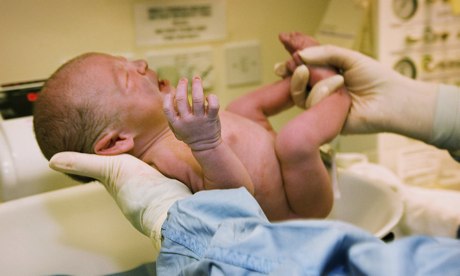
Women are left alone while in labour, wait hours for pain relief and find midwives rude or bullying, the NHS regulator has warned in a highly critical assessment of maternity services.
Prof Sir Mike Richards, the chief inspector of hospitals, said too many women giving birth still experienced care that was not good enough, and could be "truly shocking" or even frightening.
He spoke out after a survey of 23,000 women's views of their birth experience with the NHS revealed significant dissatisfaction, and sometimes anger and anguish.
One in four (25%) of the mothers, who all gave birth during February in England, said they were left alone by midwives or doctors during or after their labour or birth and found that worrying. In all 13% had been left alone in early labour, 9% in the later stages, 2% during the birth itself and 9% shortly after the baby's arrival.
The 25% is an increase on the 22% who said they had been left unattended when the Care Quality Commission last surveyed maternal opinion of their care in 2010. Maternity experts said the upward trend showed that mothers were being left in an anxious state at a critical time because maternity units were worryingly understaffed.
Belinda Phipps, chief executive of the NCT birth and parenting charity, said the rise was "appalling. Mike Richards has reinforced what NCT have been saying for years – too many women are going through pregnancy and labour without the help and support they need and have every right to expect."
Cathy Warwick, chief executive of the Royal College of Midwives, said the survey underlined that "the NHS continues to fail too many women. It sets out yet more evidence of the real-life and disheartening effects on women of the shortage of midwives." The NHS in England is short of 4,800 midwives, she said. Given that, "it is sadly inevitable that women will see many different midwives" rather than one throughout their labour.
Significant minorities of women also raised concerns about long waits for pain relief, dirty toilets on their ward and not being listened to by staff when they raised concerns. One woman said: "I was left for over two hours waiting for morphine due to staff shortages. I wanted to die due to the pain of the caesarean and felt very let down after previous perfect care. I felt lonely, helpless and uncared for that no one could help me."
Some aspects of care have improved since 2010. For example, the proportion of women saying they had trust and confidence in staff rose from 73% to 78%, more felt involved in the decisions about their care and more felt their partner was as involved as they wanted to be.
Using feedback provided by 8,000 of the 23,000 women, the CQC identified nine "better performing" trusts and seven "worse performing" trusts. Six of those are in London, including the hospitals run by the Barts Health, North West London and Barking, Havering and Redbridge trusts, confirming a long-established picture.
The health minister Dr Dan Poulter, who is also an obstetrician, welcomed the improvements in the survey but said: "In some cases new mums are not getting enough care." Hospitals should take action to improve their care, he said.
The NHS has 1,200 more midwives than in 2010, with a record 5,000 more in training, he added.

